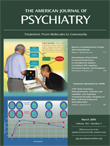Association of Schizophrenia and Autoimmune Diseases: Linkage of Danish National Registers
Abstract
OBJECTIVE: Individuals with schizophrenia and their relatives tend to have either higher or lower than expected prevalences of autoimmune disorders, especially rheumatoid arthritis, celiac disease, autoimmune thyroid diseases, and type 1 diabetes. The purpose of the study was to estimate the association of schizophrenia with these disorders as well as a range of other autoimmune diseases in a single large epidemiologic study. METHOD: The Danish Psychiatric Register, the National Patient Register, and a register with socioeconomic information were linked to form a data file that included all 7,704 persons in Denmark diagnosed with schizophrenia from 1981 to 1998 and their parents along with a sample of matched comparison subjects and their parents. The data linkage required that the autoimmune disease occur before the diagnosis of schizophrenia. RESULTS: A history of any autoimmune disease was associated with a 45% increase in risk for schizophrenia. Nine autoimmune disorders had higher prevalence rates among patients with schizophrenia than among comparison subjects (crude incidence rate ratios ranging from 1.9 to 12.5), and 12 autoimmune diseases had higher prevalence rates among parents of schizophrenia patients than among parents of comparison subjects (adjusted incidence rate ratios ranging from 1.3 to 3.8). Thyrotoxicosis, celiac disease, acquired hemolytic anemia, interstitial cystitis, and Sjögren’s syndrome had higher prevalence rates among patients with schizophrenia than among comparison subjects and also among family members of schizophrenia patients than among family members of comparison subjects. CONCLUSIONS: Schizophrenia is associated with a larger range of autoimmune diseases than heretofore suspected. Future research on comorbidity has the potential to advance understanding of pathogenesis of both psychiatric and autoimmune disorders.



